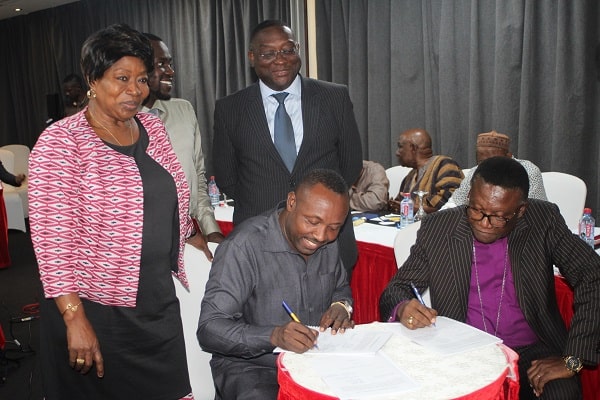
Eradicating political vigilantism: NDC refuses to sign road map
The National Peace Council’s (NPC’s) efforts to get the two main political parties to sign its road map and code of conduct in eradicating political vigilantism hit a snag when the opposition National Democratic Congress (NDC) failed to sign the document.
At a ceremony for the representatives of the New Patriotic Party (NPP) and the NDC to sign the document yesterday, the NPP signed the document, “Road map and Code of Conduct for the Eradication of Political Vigilantism in Ghana” but the NDC said other stakeholders were needed to also sign the document.
The 31-page road map has what the parties needed to do in the short, medium and long term to eradicate political vigilantism from Ghana’s political dispensation.
Moreover, a member of the NDC team, Mr Alex Segbefia, said he was not qualified to sign the document and further argued that signing of the document was premature, since it could be improved.
Political parties
The NDC argued that only four of the 22 recommendations were related to political parties, hence the need for the other agencies such as the government, the National Commission for Civic Education (NCCE), Civil Society Organisations, the Judicial Service, Electoral Commission (EC) among other institutions to also sign the document.
Moreover, the NDC representative said some senior members who could have signed or played a major role for the party at the event were not present as they were engaged in a national exercise, protesting against the EC’s decision to compile a new voters register.
Peace Council
The Chairman of the NPC, Most Rev. Prof. Emmanuel Asante, said he was, however, hopeful that the NDC would return to sign the document.
But Mr Segbefia said: “We do not think we have exhausted all the possible issues that are required to have a meaningful document that we can all work to”.
Institutions
He explained that none of the organisations or institutions were signatories to the document that was going to be signed, and ”so in effect, if you look at the communiques we have already signed with the peace council, they actually covered the four items that are directly related to the political parties”.
Mr Segbefia said the NDC could not be seen to be signing a document to which other parties who were playing a part did not sign, saying that in such a situation it would be difficult to effectively monitor it or deal with ensuring that what was being signed to would be effective.
He said the party thought the contents of the document were good but they did not have a way of making sure that they became effective.
He, however, apologised for not communicating its position on the document to the NPC much earlier.
Behaviour
A member of the NPC, the Asokorehene, Nana Susubiribi Krobea Asante, said the code of conduct spelt out standards of behaviour which applied to the two main parties.
He said it was the humble submission of the NPC that the enforcement of the Vigilantism Act would be enhanced by adoption of a code of conduct.
The Chairperson of the NCCE, Mrs Josephine Nkrumah, said the commission remained committed to the process of eradicating vigilantism in the country.
The Secretary General of the Ghana Catholic Bishops’ Conference, Rev. Fr Lazarus Anondee, said there was the need for stakeholders to demonstrate more commitment to ensure that the issue of vigilantism was dealt with in the country.
Signing
Before signing the document, Mr John Boadu, who was accompanied by the Director of Communications, Mr Yaw Buaben Asamoah, expressed the hope that the NDC would later sign the document.
The NPP, he said, was committed to dealing with political vigilantism.
“We would append our signature to this road map and would not do anything to take the peace we are enjoying for granted. We believe that all the other things that have been stated are the jobs of the institutions,” he said.
Most Rev. Prof. Asante signed for the NPC.
Background
The political vigilantism dialogue was instituted by the National Peace Council following the violence that marred the Ayawaso West Wuogon Constituency by-election in 2019.
Despite earlier disagreements, the NPP and the NDC committed to the dialogue and indicated their preparedness to end the menace.
The dialogue was meant to focus on examining the draft road map and code of conduct prepared by the Technical Committee as part of steps to tackle the menace.
